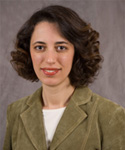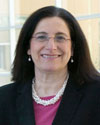Organizers
Conference Chairs
Ozlem Ergun
Georgia Institute of Technology
Associate Professor, H. Milton Stewart School of Industrial and Systems Engineering

Dr. Özlem Ergun is an associate professor in the School of Industrial and Systems Engineering. She received a B.S. in Operations Research and Industrial Engineering from Cornell University in 1996 and a Ph.D. in Operations Research from the Massachusetts Institute of Technology in 2001. Professor Ergun’s research focuses on the design and management of large-scale networks. Specifically, she studies logistics and communications networks that are dynamic, partially decentralized, and are used and operated by coordinating but selfish entities. Her main research contributions are the development of a set of new algorithmic and analytical tools and their applications (together with well known concepts from optimization and game theory) to important real world problems. She teaches undergraduate and graduate courses in optimization and logistics. Dr. Ergun was awarded the NSF Career Award in 2003.
Pinar Keskinocak
Georgia Institute of Technology
Associate Professor, H. Milton Stewart School of Industrial and Systems Engineering

Pinar Keskinocak is an associate professor in the School of Industrial and Systems Engineering, Associate Director of Research for the Health Systems Institute and co-director of the Center for Health and Humanitarian Logistics at Georgia Institute of Technology. She received B.S. and M.S. degrees in industrial engineering from Bilkent University in Ankara, Turkey, in 1991 and 1992, and a Ph.D. in operations research from Carnegie Mellon University in 1997. Before joining Georgia Tech, she was with IBM’s T.J. Watson Research Center in Yorktown Heights, New York.
Dr. Keskinocak’s research focuses on supply chain management, with an emphasis on resource allocation, revenue management, auctions/pricing, due date/lead-time decisions, production planning/scheduling, and logistics/transportation. She has worked on projects in several industries including automotive, semiconductor, paper manufacturing, printing, healthcare, and airlines. She is also actively engaged in research and applications in healthcare and humanitarian logistics.
Julie Swann
Georgia Institute of Technology
Associate Professor, H. Milton Stewart School of Industrial and Systems Engineering

Julie Swann is an associate professor in the School of ISyE at Georgia Tech. She received her B.S. in Industrial Engineering from the Georgia Institute of Technology in 1996 and her M.S. and Ph.D. in Industrial Engineering and Management Sciences from Northwestern in 1998 and 2001, respectively. In addition to her university experience, Dr. Swann participated in several research projects at General Motors and IBM, focusing on pricing in different industries. At General Motors, Dr. Swann developed a tool integrating pricing, production and distribution of vehicles while meeting Corporate Average Fuel Economy (CAFE) requirements. At IBM, she explored pricing models for efficient bandwidth allocation.
Dr. Swann is currently focused on the modeling and analysis of problems and algorithms in logistics, transportation and supply chain management. She has particular interests in developing and analyzing tools to manage demand, such as pricing, revenue management, or lead-time quotation, to increase the flexibility in the system and is currently doing work in humanitarian supply chains. Other research interests include applications of economics and optimization to healthcare policy.
Conference Committee
Gregory Abowd
Georgia Institute of Technology
George Professor and Director, Health Systems Institute & Distinguished Professor, School of Interactive Computing

Gregory D. Abowd (pronounced AY-bowd) is the George Professor and Director of HSI and Distinguished Professor in the School of Interactive Computing in the College of Computing at Georgia Tech. His research interests are in human-centered computing, with specific interests in ubiquitous computing (ubicomp) applied to issues relating to home and health. Dr. Abowd leads the Ubiquitous Computing Research Group in the School of Interactive Computing. This effort started with the Future Computing Environments research group in 1995, and has since matured into a collection of research groups, including Dr. Abowd’s own group. One of the major research efforts that Dr. Abowd initated is the Aware Home Research Initiative, of which he was the founding director until 2008.
Dr. Abowd received the degree of B.S. in Mathematics in 1986 from the University of Notre Dame. He then attended the University of Oxford in the United Kingdom on a Rhodes Scholarship, earning the degrees of M.Sc. (1987) and D.Phil. (1991) in Computation from the Programming Research Group in the Computing Laboratory. From 1989-1992 he was a Research Associate/Postdoc with the Human-Computer Interaction Group in the Department of Computer Science at the University of York in England. From 1992-1994, he was a Postdoctoral Research Associate with the Software Engineering Institute and the Computer Science Department at Carnegie Mellon University. He joined the faculty at Georgia Tech in August of 1994. Dr. Abowd is an ACM Fellow and a member of the ACM SIGCHI Academy.
Terry Blum
Georgia Institute of Technology
Director, Institute for Leadership and Entrepreneurship (ILE) & Tedd Munchak Chairholder; Professor, College of Management

Terry Blum is the founding director of Georgia Tech’s Institute for Leadership and Entrepreneurship (ILE), an interdisciplinary unit that develops individual and organizational leadership capabilities for economic growth, social responsibility, and environmental sustainability. ILE’s curriculum and activities increase students’ attentiveness to the critical cultural, economical, environmental and social issues they will face as they advance in their chosen professions, preparing them to be more effective leaders in an increasingly complex world.
Blum also holds the Tedd Munchak Chair and is a professor in Georgia Tech’s business school, the College of Management, where she served as dean for seven years (1999–2006). Blum earned a PhD from Columbia University in 1982 and has researched and published extensively on topics related to innovation and technology transfer in health services related to behavioral health care. She has served on many NIH study sections, and is a co-investigator for research grants related to the study of organizational and entrepreneurial factors that mediate the transfer, adoption and diffusion of innovation to for-profit and not-for-profit health treatment organizations.
Blum participated an organizer and director of a de novo community bank, Midtown Bank and Trust, and currently serves on the boards of the Community Foundation of Morgan County, Ferst Foundation for Childhood Literacy, and MedShare International, a not-for-profit venture that creates value and improves health through the collection of surplus medical supplies and equipment for distribution to developing countries.
Blum is committed to research, leadership development and social entrepreneurship that can provide for just, caring and sustainable institution building for a world in which we would want to live.
Jonathan Colton
Georgia Institute of Technology
Professor, George W. Woodruff School of Mechanical Engineering & Co-Director, Center for Polymer Processing

Dr. Colton came to the George W. Woodruff School of Mechanical Engineering at Georgia Tech in 1985, after completing his S.B., S. M., and Ph.D. in Mechanical Engineering at MIT. He serves as Director of the Institute-wide Center for Polymer Processing. He teaches graduate and undergraduate courses in design and manufacturing. He is principal researcher on projects sponsored by - among others - National Science Foundation, National Institute of Standards and Technology, National Institutes of Health, U.S. Department of Education, NATO, Ford, General Motors, General Electric, Schlumberger, U.S. Navy, and Lockheed-Martin Corp. He has spent a year as a Visiting Professor at Imperial College, London. Dr. Colton served on the Technologies and Logistics Advisory Committee of the World Health Organization (WHO).
Dr. Colton is a Fellow of the American Society of Mechanical Engineers and of the Society of Plastics Engineers, has been a Woodruff Faculty Fellow, and has received the NSF Presidential Young Investigator Award, the SAE Teetor Award, and the SME Outstanding Young Manufacturing Engineer Award. Dr. Colton received a NASA Space Act Award. He has received the outstanding paper award from the Rapid Prototyping Journal. In 2007, he was named the Jack M. Zeigler Outstanding Educator Award, George W. Woodruff School of Mechanical Engineering at the Georgia Institute of Technology. He is a registered professional engineer in the State of Georgia.
Reginald DesRoches
Georgia Institute of Technology
Professor and Associate Chair, School of Civil & Environmental Engineering

Each year, the United States experiences thousands of earthquakes and, on average seven earthquakes per year that have a magnitude of 6.0 or greater, enough to result in damage in many parts of the country. The economic damage and potential deaths resulting from a large magnitude earthquake are considerable. Specifically, damages from a single large metropolitan earthquake could result in hundreds of billions of dollars in direct and indirect losses. Reducing the risk of loss from earthquakes requires predictive models of structural performance during earthquakes, and the development of innovative mitigation technologies to reduce those losses.
Professor DesRoches’ research, service, and professional interests center on development of mitigation strategies to reduce the risks from earthquakes, particularly, earthquakes in the central and southeastern United States. His specific research interests include seismic resistant design and retrofit of bridges, protective systems for buildings and bridges, performance of transportation networks, and structural applications of smart materials. He is currently the deputy director of the NEESR-Grand Challenge Project, "Seismic Risk Mitigation for Port Systems". He is the Chair of the ASCE Seismic Effects Commitee, and is on the Executive Committee for the ASCE Technical Council for LIfeline Earthquake Engineering. Professor DesRoches has been on the Board for Infrastructure and the Constructed Environment for the National Academy of Engineering since 2002, and currently serves on the NRC panel reviewing the plans for protecting coastal Louisiana. Professor DesRoches was a 2001 National Science Foundation "CAREER" award recipient, and was awarded the Presidential Early Career Award for Scientists and Engineers (PECASE) in 2002. He is a two-time invitee to the National Academy of Engineering Frontiers of Engineering Program (2002 & 2004). He is a recipient of the 2007 Walter L. Huber Civil Engineering Research Prize, and the Georgia Tech ANAK Award (2007). The ANAK award is considered the highest honor the undergraduate student body can bestow on a Georgia Tech faculty.
Leigh Fitzpatrick McCook
Georgia Tech Research Institute (GTRI)
Division Chief, Socio-Technical Systems Division, Information Technology and Telecommunications Laboratory

Ms. McCook is the Division Chief of the Socio-Technical Systems Division within the Information Technology and Telecommunications Laboratory at GTRI. Her expertise includes technology transfer, outreach, planning, and program management. Ms. McCook currently serves as Program Manager for state Homeland Security/Emergency Response programs at Georgia Tech Research Institute. In this capacity, she is responsible for activities ranging from outreach, training, exercises, planning, technology development and integration, and policy. She works closely with the State of Georgia in capacities of homeland security and emergency response, including building stakeholder consensus, developing regional response plans and enhancement plans for the State, and designing and implementing exercise and training programs. She has also served as Associate Director of Center for Emergency Response Technology Instruction and Policy. In this capacity she was charged with building consortiums of academia, government, and NGOs to support research and technology transfer activities.
Ellen Zegura
Georgia Institute of Technology
Professor and Chair, School of Computer Science, College of Computing

Professor Zegura’s research concerns the development of wide-area (Internet) networking services and mobile wireless networking. Wide-area services are utilized by applications that are distributed across multiple administrative domains (e.g., web, file sharing, multi-media distribution). Her focus is on services implemented both at the network layer, as part of network infrastructure, and at the application layer. In the context of mobile wireless networking, she is interested in challenged environments where traditional ad-hoc and infrastructure-based networking approaches fail. These environments have been termed Disruption Tolerant Networks. For more information relating to Ellen, please visit her personal webpage.
